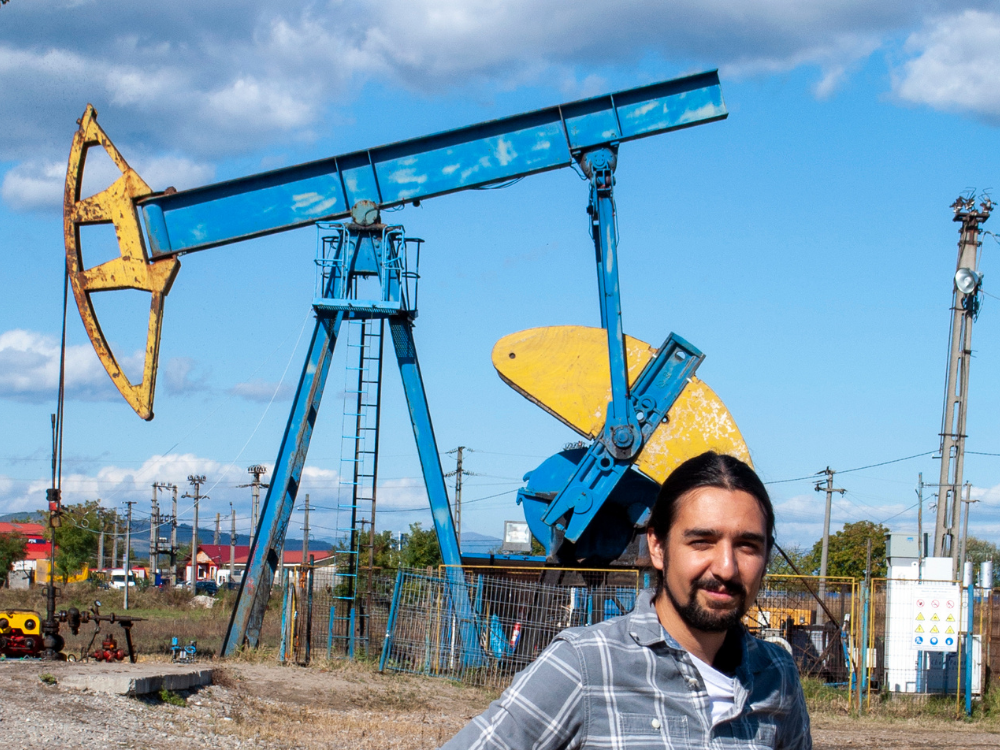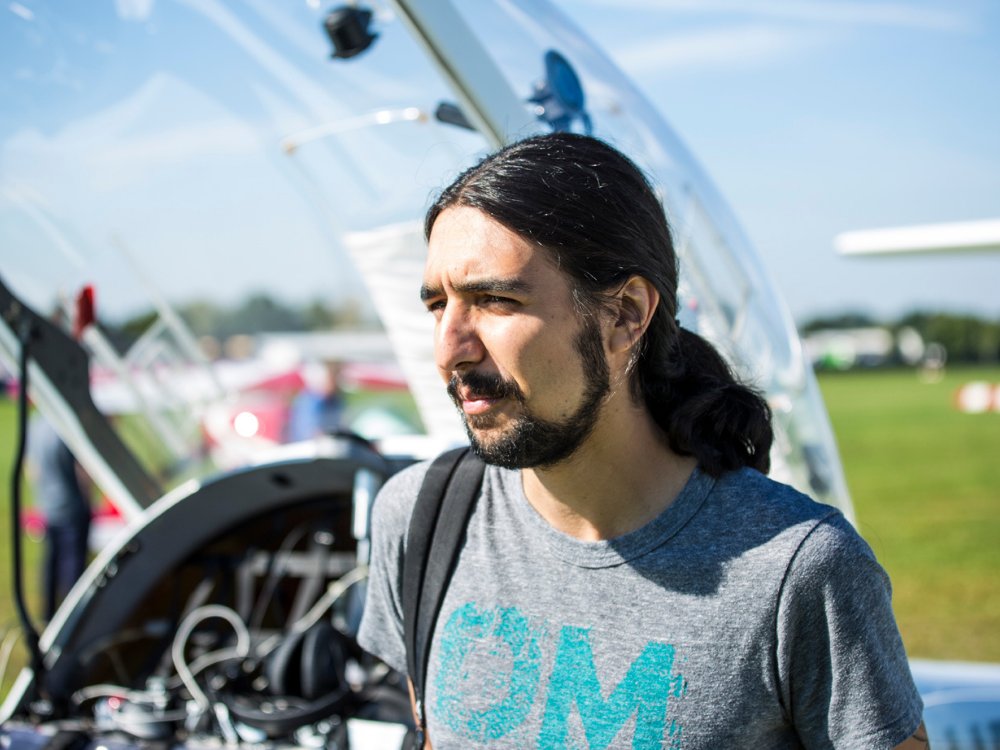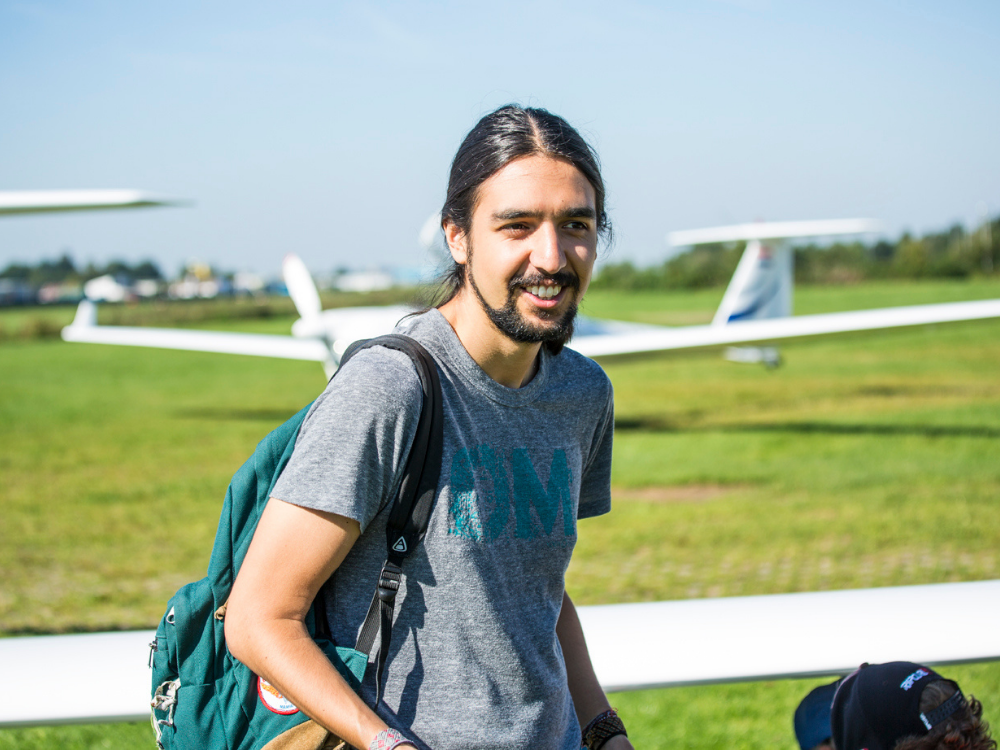There was always a part of Daniel that wanted to learn more about and ways to solve what was happening with the air quality. He earned his undergraduate degree in chemical engineering at La Universidad Iberoamericana in Mexico City, where there was always this idea of The University of Texas at Austin as being one of the world leaders in chemical engineering. Daniel and his classmates would use papers, textbooks and references to professors and research staff from UT Austin, where they felt “that is where research gets serious.”
Ph.D. in Chemical Engineering
Daniel went on to study at the McKetta Department of Chemical Engineering at The University of Texas at Austin for graduate school, with a focus on environmental and atmospheric sciences under the mentorship of Professor David Allen.
“Professor Allen encouraged us to consider how the research applies to the outer world, and to ask ourselves how the policymakers and different organizations are going to perceive and use it.” Daniel goes on to say,
“That was particularly useful for me because the core of what I do now is what we call policy-relevant research. In this case, it is research that can turn into real action in reducing emissions.”
After completing his Ph.D. in chemical engineering, Daniel did a postdoc at the Environmental Defense Fund (EDF), researching methane emissions from oil and gas production. Now a senior scientist with EDF, where he focuses on reducing greenhouse gas emissions internationally.
“Chemical engineering gives you the opportunity to dig deep into the basic building blocks of science and get the right foundations for whatever you want to do.” Daniel goes on to say, “What I found very interesting of UT Austin being such a hub for energy research, is that you can then get exposed to knowledge from other partners within and outside of engineering. This also gave me a thorough understanding of the topic, which was especially valuable in my job that is not solely about academics or scientists. That exposure to the wider world was extremely valuable.”
The collaboration and interconnectivity with so many others across expertise, engineering, and in different organizations, helped Daniel have a broader perspective which he thinks was very important.
What Daniel has found to be one of the most valuable skills for being a scientist in his career is the ability to be good at problem solving and the processes that needs to go into finding a solution. With a chemical engineering background, he feels that even if exposed to a very different problem, you have good elements to think through it. Something he also gained was creative thinking -— the ability to think outside of the box and find a way to connect the dots and not following just one way of thinking. That's especially useful for Daniel who is now working as a scientist in an international context, where it helps him to bring new things to the table and appreciate contributions and perspectives from others.
Being an International Student
At UT Austin, and especially within the Cockrell School of Engineering, Daniel was exposed to a range of nationalities. His exposure to people from completely different worlds helped him navigate the processes and ways of relating in a university environment that were different from Mexico. Taking classes, doing research and spending time with international students was truly beneficial and fostered a community with different perspectives.
There were two things that especially helped Daniel through the challenges of being an international student. First, it was extremely important for him to create community. International students in general, regardless of where they come from, are eager to create that. So, he recommends taking advantage of that desire for community to support each other. Secondly, most graduate degree programs are so focused, intensive, and ambitious, that it's very easy to make the world very small. For many, they may spend most of their time just talking to three or four people. But Daniel wants to remind students that the universe is extremely diverse, and the university is a universe in and of itself. He encourages students to not be too shy to take advantage of what's also outside of the College of Engineering.
Life as a Scientist Addressing Climate Change
Daniel’s favorite thing about his job at a science-based advocacy organization is that it’s a place where everyone is completely passionate about the mission, that there’s this incredible energy of everyone being so committed to solving the problem of climate change. He appreciates that it’s a non-traditional career path in the sense that it's not purely academics or a research lab, but where almost daily, he gets to interact with colleagues working at different universities including several colleagues at UT Austin.
What Daniel appreciates about policy-relevant research, is that it is research connected to making a difference. It is still objective and neutral, but very well aligned with the resulting policy relevance. For Daniel, it has been an incredible experience to see research that he has been involved with already having a major impact.
In order to maintain a positive mindset among the overwhelming, negative information about environmental issues, Daniel says, “it starts with being honest and saying that I don't think I'm able keep a positive mindset all the time. The size of the problem and urgency of the climate emergency makes most people have some sort of trauma related to it. I think it starts with the honesty of saying that we all carry some trauma from working on and being exposed to these issues.”
At the same time, what makes the difference for Daniel is being in a community of people that create this team and are supportive, and that he is working directly on something that can make a difference.
From his time at UT Austin, when he first began working on projects looking at methane emissions, a powerful greenhouse gas, to now, he has witnessed a big shift in awareness. Initially, few knew or cared what methane was. However, recently, there have been stories in the media practically every single day on methane. Seeing the shift from methane emissions being an unknown topic to something that is being discussed daily and with people expressing the need for solutions also helps.
Daniel and his colleagues at EDF have set up and implemented a framework for doing research that guarantees that the research is independent and objective. Rather than keeping out stakeholders, he understands the importance of sitting at the table with different stakeholders, including the oil and gas industry, and affected governments and communities. For example, he says that the oil and gas industry needs to be at the table because it is in large part responsible for the issue, the ones that need to implement solutions, and they have a lot of expertise in terms of what can be done to reduce emissions.
The research framework enables industry to provide feedback, but it's the researchers who decide whether or how to incorporate the feedback. In addition, there is always an independent panel of experts reviewing the full research process. The results and data collected are released transparently to the public and to publications. By a combination of transparency and accountability, they’re able to make sure that the research process is always objective and kept from industry pressures, even with the understanding that dialogue with industry is important because they do need to be part of the solution.
Current Research
The research that Daniel and his colleagues recently undertook began with a project to understand methane emissions in the U.S., and it translated into mitigation actions at different levels. In terms of industry and state and federal governments, the idea was to take some of those lessons and translate them globally. In partnership with the United Nations Environment Program, they created a set of international studies that are currently underway to measure emissions from the places that are major producers of oil and gas emissions. As part of that, Daniel and his team went to Mexico and their research was recently published. They’ve gone to Canada and now a lot of the work is within Europe. There are projects going on in Africa and Asia as well.
Having been on this methane journey, Daniel reflects on how much it has changed and that it is now being called the methane wave. He is inspired that there is now attention from the world, not just of the problem but the fact that there's a toolkit of solutions to be implemented.
The European Union will likely take action to regulate methane emissions as it was featured significantly at the 2021 United Nations Climate Change Conference (COP26), which is a meeting where governments discuss climate change. There is also a discussion of various governments signing a pledge in which they will all contribute to reducing emissions. Daniel says, “there's a lot happening with regards to methane emissions and having strong data and science to support the decisions that are starting to be made is extremely important.” What he is most looking forward to is materializing his research to provide the evidence that is needed for emissions to be reduced. Daniel feels that there is still a lot of work to do on methane, but it's an extremely exciting time to be working on it.
COP26 and end of year 2021 updates:
- The European commission drafted oil and gas methane regulation at the end of 2021.
- More than 100 countries signed the Global methane pledge, targeting a 30% reduction in global methane emissions by 2030.
- In other words, the world is realizing that we need to act on methane now: doing so represents our best opportunity to slow the rate of global warming.








